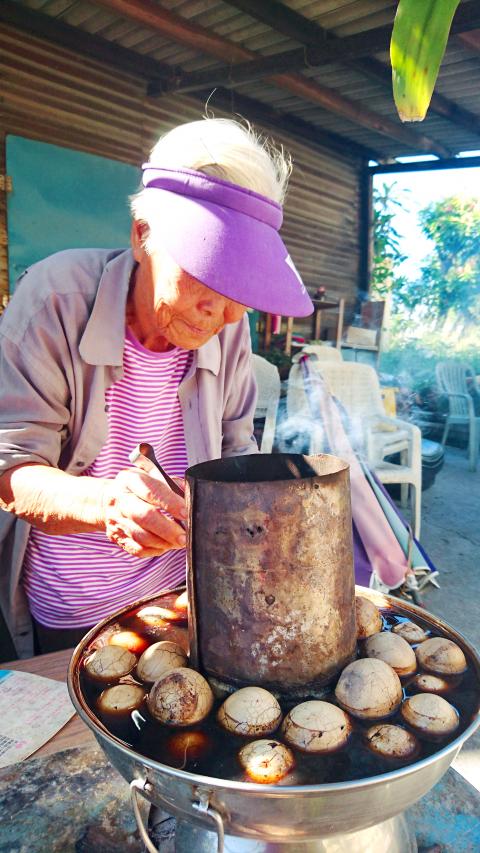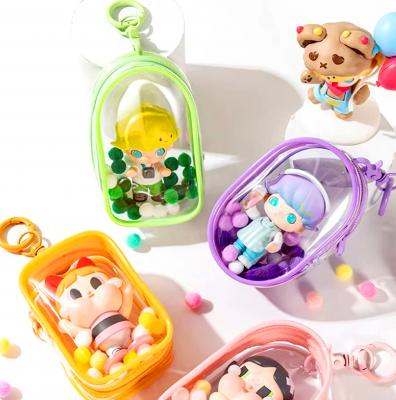Over the last couple of years, the price of everyday goods has been going up and up, and tea eggs sold by convenience stores chains have gone up from NT$8 to NT$10 each. However, there is a “tea egg granny” on Yuguang Island in Tainan’s Anping District who has resisted raising the price for 30 years. At only NT$5 a pop, many people say, “That warms the heart as well as the stomach!” Some people who have tried her eggs post comments to share with their online friends, and some people make special trips just to buy them.
Yuguang Island is known to many elderly Tainanese as the Chiu-mao Garden. “Tea egg granny,” who is in her 80s, says that in the old days there was a recreational area in the Chiu-mao Garden and many students and other people went there for fun. Three decades ago she used to sell sea snails in spicy wine in the recreational area, along with tea eggs at NT$5 apiece. Since there were a lot of visitors, business was pretty good, but later on the Chiu-mao Garden went into decline and business dropped off. Over the last couple of years, Yuguang Island’s reputation has once more been on the rise, and visitors are flocking there again. “Tea egg granny” sells herbal tea and tea eggs from an unmarked stall opposite the Yuguang Borough activity center, as the scent of burning charcoal and tea eggs wafts about. While three decades have passed in a flash, the price of her eggs is still NT$5 each.
“Tea egg granny” says that, as she was getting on in age, she initially decided to stop selling eggs, but she did want a way to pass the time and avoid staying at home with nothing to do but let her mind wander. That and making a little spending money are her reasons for going on selling her goods, albeit in small quantities. When people hear that one egg costs just NT$5, many of them are surprised and say, “That’s really cheap.” Because the eggs are such great value, young people often ride over to Yuguang Island just to buy some.

Photo: Liu Wan-chun, Liberty Times
照片:自由時報記者劉婉君
(Liberty Times, translated by Julian Clegg)
近兩年民生物資不斷上漲,連鎖便利商店的茶葉蛋也從一顆八元調漲到十元,台南安平區漁光島的「茶葉蛋阿嬤」,卻堅持三十年不漲價,一顆只要五元的吸睛價,令不少民眾大呼「真是暖胃又暖心!」不僅吃過的網友貼文分享,還有民眾專程前往購買。
漁光島也是許多老台南人口中的「秋茂園」,年逾八旬的「茶葉蛋阿嬤」說,早年秋茂園有一個遊樂區,有許多民眾和學生前往遊玩,三十年前就在遊樂區賣燒酒螺和一顆五元的茶葉蛋,由於遊客人數眾多,生意相當不錯,但隨著秋茂園沒落,生意也大不如前。近兩年漁光島的名聲日漸響亮,遊客再度造訪當地,「茶葉蛋阿嬤」在漁光里活動中心對面的無名攤位賣青草茶和茶葉蛋,炭火、茶葉蛋的香氣在空氣中飄散,價格三十年如一日,一顆依然五元。
阿嬤說,她的年紀大了,原本已經不想賣了,但想要打發時間,避免在家閒著胡思亂想,也賺點零用錢,才會少量銷售,先在家煮好,再到攤位以炭火繼續保溫,使茶葉蛋更入味,許多人聽到一顆只要五元,都會驚訝地說「好便宜」,因為物超所值,也常有年輕人特地騎車到漁光島購買。
(自由時報記者劉婉君)

If you’ve recently spotted adults parading around with cuddly toys dangling from their designer handbags, your eyes haven’t been deceiving you. The playful trend of adorning bags with cute charms has become popular among people of various ages. Plushies like Labubu and anime and manga characters such as Chiikawa have become must-have accessories that make personal statements. The practice of attaching charms to personal items has been common across cultures throughout history. In ancient civilizations, charms were often used as symbols of protection, good luck, or identity. Fast-forward to more modern times, and style icons like Jane Birkin, a

A: Apart from Jin Yong, the late martial arts novelists Liang Yusheng and Gu Long were also very popular. B: Wasn’t Liang a pioneer of the “new school” wuxia genre in the 20th century? A: Yup, I really like his Tianshan mountain series. All the characters — such as the “White Haired Demoness” — are so vivid. B: The roles in Gu’s books are lively, too — like the “Fragrant Commander” Chu Liuxiang. A: And the TV drama adapted from the Chu Liuxiang series swept across Taiwan in the 1980s, with ratings surging over 70 percent at that time.

★ Bilingual Story is a fictionalized account. 雙語故事部分內容純屬虛構。 Kevin leaned over the bubbling pot. “Hey. . . are you okay? You’ve barely touched your food.” Zoey blinked. Her face was red — not from blushing, but from the “mala” spice and the heat of the room. Her blond hair clumped to her face like strands of fine spaghetti. Her carefully applied makeup now streaked. “This isn’t what I expected,” she said softly, forcing a smile. All around them, Kevin’s friends were laughing, shouting, and tossing ingredients into the broth. The air smelled of chili oil and garlic.

Continued from yesterday(延續自昨日) https://www.taipeitimes.com/News/lang If plushie charms are cute little nods to people’s interests, ita bags are full-on declarations. The term “ita” comes from the Japanese word itai, which means “painful” and reflects the overwhelming visual intensity of these bags. An ita bag is essentially a handbag, backpack, or tote meticulously decorated with an extensive collection of merchandise dedicated to a specific character or idol. These bags usually feature a clear plastic window to display carefully arranged pins, badges, keychains, or fan art. Both the interior and exterior may be covered in fandom memorabilia, creating an aesthetic so intense that it’s almost “painful”